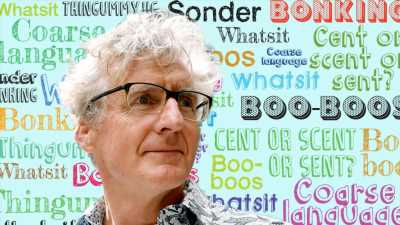Save articles for later
Add articles to your saved list and come back to them any time.
Orwell would roll in his grave. No, forget that. Orwell has been spinning like a rotisserie since he left us, this latest trend only seeing the poor sod gather revs. I speak of the Orwellification of English, or anything-ification for that matter, as more writers fall for the suffix.
Isolating the origin is tricky. Legit examples litter English, of course, from the justification of a cause, the identification of a culprit. Yet tracing the linguistic culprit, the day the suffix went rogue, is a goose chase. Suspects include the postcode yelp about a suburb’s gentrification, seeing such proletariat Tigerlands as Balmain or Richmond, say, cop a bougie makeover.
Californication is the other smoking gun, officially debuting in 1966. Back then, a Time article captured the east-coast angst of Hollywood fakery crossing the continent, the onset of day spas and plastic surgeons threatening to implant the LA superficiality. In 1999, the Red Hot Chili Peppers popularised the slang with both album and single, as did the carnal comedy a few years later.
Can’t stop, won’t stop with the suffixes! Credit: Jo Gay
Regardless the trigger, the trend has accelerated. You only need browse the placards of a Byron Bay action group, griping about the Gold Coastification of their sacred patch. Or register the alarm in such headlines as the Marvel-ification of cinema, the Trumpification of democracy, the woke-ification of comedy.
As you can see, the hyphen is optional. So too the variants of -isation, with its zee in the US, like the Uberisation of the workforce, in league with the verbal offshoot of -ify, where a certain doll stands to Barbify this summer’s colours. The clumsiness is deliberate, as often the process in focus is viewed in a pejorative light, demanding the label have a matching brutality.
Lauren Michele Jackson, writing for the New Yorker in August, calls it “the -ification of everything”. The transition is called nominalisation, converting one part of speech into a noun. Typically a verb is chosen, like classify turning into classification, but this new craze is likelier to kidnap a brand as much as a VIP. Or morph a simple noun into a messier noun, via a bogus verb, like the appification of consumerism.
Yet tracing the linguistic culprit, the day the suffix went rogue, is a goose chase.
Kiwi poet Helen Sword dubs them zombie nouns, echoing Orwell’s warnings of lifeless jargon, where crisp verbs and old nouns succumb to bureaucracy’s passive voice. Instead of use, think utilisation. Rather than note, try notification. All the while the message upholstered in indemnification and obfuscation.
Cory Doctorow, the Canadian-UK critic, fanned the fire earlier this year, writing on his blog about TikTok’s enshittification of social media. In Doctorow’s words, a platform worsens, shrivels, when it eventually “sits between buyers and sellers, holding each hostage to the other, raking off an ever-larger share of the value that passes between them.”
Twitter subscribers know the atrophy too well, their sweet bluebird of 2006 now a stern X in the name of Muskification. That’s how the social trend works, as much as the language trend, creating a Frankenstein noun, rather than a neater Roget option, in order to lament a perceived impoverishment.
Lego-like, the quick-click suffix of each assembly has only seen the trick widen. Kelsey Weekman, writing in BuzzFeed, reckons “much of the joy in suffix-ify-ing [sic] a word comes from the absurdity of smashing two words together that never would have met in organic conversation.” Until now, perhaps, as we chat about the AI-fication of art, the Blockification of renos, even the Melbournisation of Sydney. Language fads are one thing, the faddification of English another beast altogether.
To read more from Spectrum, visit our page here.
The Booklist is a weekly newsletter for book lovers from books editor Jason Steger. Get it delivered every Friday.
Most Viewed in Culture
From our partners
Source: Read Full Article

